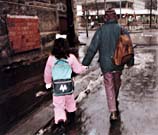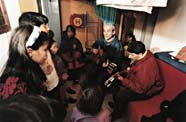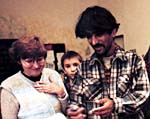 Bridging
The Culture Gap
Bridging
The Culture Gap
By
Angeli Primlani
Photos
by Julie Denesha
Hauling his backpack through Ostrava's main station on a
snowy, smoggy winter afternoon, his dark hair peeking out
from under a ski cap, Kumar Vishwanathan looks like any
South Asian college student in the world.
He is late, and out of breath from running. "We're
preparing to take some of the children to the mountains
and there's just so much to do," he says.
But Kumar is not a student. He has come to take us to
Unimo bunky, the temporary shelter on the edge of Ostrava
where 25 Romany (Gypsy) families, displaced by last
summer's floods, now live. Articulate, cheerful and
unfailingly polite, Kumar has recently found himself in
the challenging position of bringing the community's
white Czechs and Romanies together through a mixture of
endless energy, diplomacy and pure will.
Unimo bunky is a two-story structure of corrugated metal
that looks like a tool shed with barred windows. The
ground around it is a mixture of gravel, snow and mud.
Approximately 80 people live in the bunky. It was
originally intended to be inhabited for a month or so by
the refugees. Kumar hopes to have everybody moved into
apartments by spring. "Now we have to survive the
winter," he says.
Kumar Vishwanathan, 34, is from the town of Kerala in
south India. He met his Czech wife, Ladislava, while
studying at the Pushkin Institute in Moscow. The couple
married and moved to Olomouc six years ago, where Kumar
worked until this year as a physics teacher. He says he
was beaten up by skinheads once, but after a while, the
community has come to know and accept him. "It's a
small town," he says smiling. "I have more
Czech friends than friends from anywhere else."
Last summer, when floods hit Moravia, he and Ladislava
read stories in the Czech press about Romanies looting a
school in Ostrava. They felt the reports had been
exaggerated. Angered by the accounts, Kumar traveled to
Ostrava to try to discover the truth for himself. In the
process, he met with members of the Romany community,
social workers and town officials. Now, funded by a
potpourri of private charities including Soros Foundation
and the Foundation for a Civil Society, Kumar commutes
regularly to Ostrava where he lives during the week in
Unimo bunky and acts as a combination liaison,
fundraiser, organizer, mediator and social worker.
To establish order in the crowded emergency
accommodation, Kumar first had to convince members of
different Romany clans to work together. The residents of
the bunky are all members of the same Romany cultural
group, the Rumungri. They break down into several clans,
which Kumar compares to medieval noble families.
"Most of the people you see [begging] in the square
are from [another] group of Romanies, the Vlasske or
Olasske. It's a group within that group that picks
pockets and join gangs ... and it's not all of the
Vlasske by any means," says Kumar. The Rumungri, he
adds, are more settled and not known to generally engage
in antisocial behavior.
When it was announced that a group of Romany refugees
would be moving into the shelter, the Romany residents of
Na Liscine, a neighborhood on the edge of Ostrava, put
together a petition to keep them out.
According to Petr Vanek, head of the Lord Mayor's office
in Ostrava, unforeseen problems occurred when, ignorant
of clan differences, city officials housed members of
different Romany groups together. "We were just
concentrating on saving people's lives," he says.
"The police had to go into one shelter because one
group [of Romanies] was stealing from the other."
Inside the flimsy corrugated building it is surprisingly
snug. There are two floors, each containing 12-16 very
small rooms. Toilets and washrooms are communal, with a
long trench-style sink and a washing machine that often
doesn't work. The toilet stalls are locked, with each
family having a key for its stall. "This gives them
some sense of privacy," said Kumar. All the cooking
is done on hot plates in the rooms.
We are greeted in the hall by Pavel Mercinko, a compact,
burly man wearing a white tank shirt that shows off the
huge blue-green tattoos on his upper arms. "You are
friends of Kumar?" he asks. It is all the
introduction he needs. "He's a very good man,"
he says. Mercinko invites us in and presses on us more
coffee, beer and tea than we can possibly drink. His
room, like every other personal space in the bunky, is
absolutely spotless.
 A pair of guitarists, Josef Krostan and Gejza Balaz, join
us. They and some of the children of the bunky treat us
to an impromptu concert of Romany and Czech music as we
spill out in the hallway under the hanging laundry. A
slender, dark boy says to us in English, "Hello, my
name is Roman. How are you?"
A pair of guitarists, Josef Krostan and Gejza Balaz, join
us. They and some of the children of the bunky treat us
to an impromptu concert of Romany and Czech music as we
spill out in the hallway under the hanging laundry. A
slender, dark boy says to us in English, "Hello, my
name is Roman. How are you?"
Roman studies English at a community center established
by Kumar and the residents of the bunky to reach out to
the Romanies already living in Na Liscine. The center
offers singing and dancing programs, preschool training,
Czech and English classes, mediation for medical services
and legal advice. Classes are free and the teachers all
volunteer their time.
Mercinko and other residents all say they are looking for
work, but there isn't any to be found right now.
"The [economic] situation is so bad. Companies are
not in a good position and they aren't taking
people," says Krostan. His brother Jaroslav says
that he hopes that he will not have to move into a group
of apartments with only Romanies. "Not all Romanies
are the same," he says. "My wife and I like our
peace and quiet."
Balaz, one of the guitarists, holds neither a Czech nor a
Slovak passport. Kumar helps such people through the
minefield of paperwork created by the 1993 citizenship
law. To qualify for Czech citizenship, applicants must
produce proof of Czech residency prior to the split of
Czechoslovakia. Families who had lived in the Czech lands
for generations became stateless overnight because of a
lack of proper documentation. Some who were able to prove
a Slovak connection were able to get Slovak citizenship,
but many remain without a legal residency in either
country.
Even employers willing to hire Romanies will not give a
job to someone without papers. Without citizenship, they
are not entitled to any public benefits. Some companies
hire stateless people as day laborers, but the pay is
unsteady, and not all employers are scrupulous about
paying.
"[These people] are completely open to
exploitation," says Kumar. "They have no
redress, no medical care, nothing."
We go with Kumar and his friend Honza Effenberger to
Privos, a devastated neighborhood in Ostrava. It's an
ill-lit, garbage-strewn place. The ground-floor windows
are dark and empty. The glass is broken. The paint on the
walls is stripped away to bare brick well over our heads,
showing where the water level was. Yet families have
moved back to Privos. There are children playing in the
street and lights shine in the upper floor windows.
"This is a Romany ghetto," says Effenberger.
"The city moved all the Romanies from the center to
here, because this is the lowest grade of apartments and
they can convert apartments in the center into offices
and make a lot of money."
Effenberger teaches at the Cirkevni Basic School, an
elementary school established by a group of concerned
educators specifically for Romany children. Effenberger
had previously been a teacher in the state Special School
system. "We realized the majority of children didn't
belong there," he says. "They deserve a normal
school."
An estimated 80 percent of all Romany children are placed
in schools for the mentally retarded because of problems
they encounter in the first year of basic school, usually
because of language difficulties.
"For example, a Czech child might know that a baby
cow is a calf, but a Romany child might not. Maybe their
parents know the words [for cow and calf] in
Romany," says Effenberger. "The entire
education system assumes this kind of basic knowledge.
Even the textbooks are written that way."
The Cirkevni school offers programs for dyslexia and
other learning disabilities. About 10 percent of the
students at the school are white Czechs. The classes are
integrated, and the students get along well together,
says Effenberger. But they do not associate with each
other outside of school. "They live in different
neighborhoods," he explains. "You won't see
them kicking a football around together." Kumar, who
speaks several languages, teaches English at the school.
He also makes it his job to see that the children who are
enrolled in the school attend classes, sometimes walking
them there himself.
 After
having served as the liaison between different Romany
clans and groups, the next step in Kumar's plans is to
bring the Romany and Czech communities together. He is
taking the children from the bunky on field trips outside
Ostrava to give them an experience of the world outside
the Romany community. There is a vacant lot between the
Romany neighborhood of Na Liscine and a nearby white
Czech neighborhood. In the spring, Kumar plans to build a
playground here so children from both groups will have a
chance to meet socially. After
having served as the liaison between different Romany
clans and groups, the next step in Kumar's plans is to
bring the Romany and Czech communities together. He is
taking the children from the bunky on field trips outside
Ostrava to give them an experience of the world outside
the Romany community. There is a vacant lot between the
Romany neighborhood of Na Liscine and a nearby white
Czech neighborhood. In the spring, Kumar plans to build a
playground here so children from both groups will have a
chance to meet socially.
He also invites journalists and students from Ostrava
University to stay in the shelter, offering non-Romanies
the chance to meet Romanies in a nonthreatening
situation.
Kumar is cautiously optimistic about the future of
Czech-Romany relations in Ostrava. But two of the
volunteers who work with him disagree.
"It's getting worse," says Marcela Kozusnikova,
a student in the Social and Health Faculty at Ostrava
University. "There is a lot of prejudice here. Some
people have never met any Romanies so they judge people
based on prejudice. Most of the [non-Romanies] have had
some kind of bad experience. They don't know it's really
just a small group causing the problems. The rest may be
poor, but they live like modest people."
Her fellow student, Dasa Zdrazilova, is also pessimistic.
"Children learn prejudice from adults," she
says, "and you can't change adults."
Kumar, however, remains undaunted. "Something
happened during the floods," he says. "There is
a current that I think is gaining strength. There are
sensitive people who want change and who are looking for
a way out of the current situation. If you can only help
one child, it's worth it."
This
feature first appeared in The
Prague Post
Wednesday, January 21, 1998

|